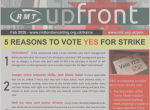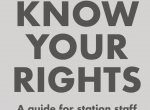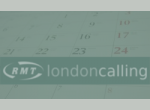RMT representatives: Janine Booth, Jamie Parry
Unite had three representatives at the meeting, PCS one. The other unions - TSSA, ASLEF and Prospect - were not represented.
‘Safety Moment’
We raised the issue of sexual harassment, especially on Night Tube. Management responded that the Mayor’s office (Michele Dix and Amy Lame) had drawn up a charter for women’s safety at night. The unions expressed alarm that we had not been consulted about this. Management agreed to arrange for our involvement.
Unite raised the issue of mental health, in particular the impact of ‘Transformation’. There is an Employee Health and Well-being Steering Group that includes union reps. Unite asked for data about people leaving under Transformation.
Terms of Reference
We welcomed that the Terms of Reference clarified that this forum will not impinge on the role of the machineries of negotiation and consultation in the various TfL companies. We raised several other concerns about the terms of reference:
- The name of the forum - we want it changed to ‘Equality, Diversity and Inclusion’, as it is important that equality is not forgotten, that discussions focus on treating people equally when appropriate as well as treating them differently in line with their diversity. (RMT successfully convinced Network Rail to adopt this title).
- The scope of the forum - does it cover all companies under the TfL umbrella?
- How the unions put items on the agenda: this is not specified in the current Terms of Reference.
- The length of meetings: we think they need to be significantly longer than the 90 minutes currently allocated
- Sub-groups: we proposed that to look in more detail at issues, the Terms of Reference specify that the form can establish sub-groups eg. sexual harassment, neurodiversity, etc.
- Release: we proposed a full day’s release each for preparation, attending the meeting, and feeding back afterwards (note that one of our reps had been release only for the 90 minutes of the meeting).
Management noted these points and said that they would respond in due course.
Skills and Employment Engagement
Management gave a presentation about their various projects to improve equality and diversity in recruitment. This includes various schemes targeting eg. schools with high BAME populations, learning-disabled 16-24-years-olds. Full information is in the presentation, which can be obtained from management.
In line with RMT policy, we raised our concern that people on these schemes (eg. Steps Into Work) be paid. Management said that they are considering this as part of their review, but also suggested reasons for them not being paid eg. it may not count as work, if we pay people, we may not be able to offer this to as many people, etc. We pointed out that this sounded like management talking themselves into not paying eg. disabled people on schemes where non-disabled people on other schemes eg. apprenticeships, are paid, and thereby discriminating against disabled people.
Management provided figures on graduate and apprenticeship recruitment, which showed some improvement but still quite shameful figures, the worst being that London Underground’s 2018 apprentice intake was 100% male.
Zero Tolerance campaign
Management are in the early stages of planning a ‘zero tolerance’ campaign, and ask for trade union input. We stressed that it is not necessarily effective to tell staff that certain behaviours will not be tolerated without explaining reasons. Without an educational element, a zero-tolerance campaign will come across as authoritarian and may even be counter-productive.
We also highlighted that abusive behaviour in the workplace takes place in the context of hierarchies. Where the perpetrator is in a position of power over their target (eg. their supervisor or line manager), their conduct can cause more harm and be harder to object to. Reduction of hierarchy and power differentials is key to reducing abusive behaviour.
We also stressed the importance of recruiting to leadership roles people who demonstrated their commitment to equalities.
Other business
We requested the release of union reps to attend union-run Equality courses. Management responded by suggesting corporate-run courses, but we stressed that they needed to be union-run, while floating the idea that we might, for example, allow a guest speaker from management should the company agree the release.
- 3142 reads






